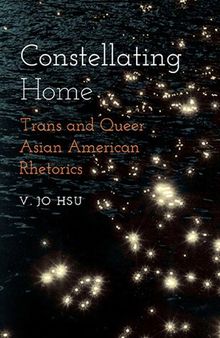دانلود کتاب Constellating Home: Trans and Queer Asia American Rhetorics
by V. Jo Hsu|
|
عنوان فارسی: خانه صور فلکی: سخنان ترنس و کوئیر آسیای آمریکایی |
 دانلود کتاب
دانلود کتاب
 جزییات کتاب
جزییات کتاب
Winner of the Innovations in Community Writing Book Award from the Conference on Community Writing
“For those interested in rhetoric studies, trans and queer studies, and Asian American studies, this book offers a case study in queer, trans, and disabled Asian and Pacific islander historiography and storytelling, depicting how these individuals have always forged, and will continue to forge, ways of being ‘at home’ in their bodies and the spaces they occupy.” —Stacey Park, Lateral: Journal of the Cultural Studies Association
“Hsu’s position as a participant-activist-scholar facilitates immersive, in-depth and reflexive narrative accounts that capture the messiness of everyday struggle … This is a book I wholeheartedly recommend to disability, race and gender scholars, as well as cultural ethnographers and auto/ethnographers, as it cogently and compellingly makes the case for intersectional and inclusive theory and praxis.” —Viji Kuppan, Disability & Society
“Hsu’s exploration of sense-making processes, modes of relationality, and worldmaking possibilities produces a rich and particular narrative of resistance and refusal. Constellating Home is compelling, theoretically rich, and beautifully written.” —Gust Yep, author of Queer Theory and Communication: From Disciplining Queers to Queering the Discipline(s)
“Constellating Home will be incredibly useful for any of the many academic fields that are trying to make sense of marginalized communities but struggle to describe and honor the diversity and heterogeneity of individual experiences.” —Lori Kido Lopez, author of Asian American Media Activism: Fighting for Cultural Citizenship
Constellating Home: Trans and Queer Asian American Rhetorics explores how race, migration, gender, and disability entwine in conceptions of deserving citizens. V. Jo Hsu explores three archives of trans and queer Asian American (QTAPI) rhetorics, considering a range of texts including oral histories, photography, personal essays, and performance showcases. To demonstrate how QTAPI use personal narrative to critique and revise the conditions of their exclusion, Hsu forwards a critical approach to storytelling, homing, which deliberately engages sites of alienation and belonging. Through a practice of diasporic listening, Hsu tracks confluences among seemingly divergent journeys and locates trans and queer Asian American experiences within broader US and global politics.
The stories at the heart of Constellating Home center the voices of trans and nonbinary people, disabled people, and others often overlooked in conceptions of US citizenry. Hsu’s analyses demonstrate the inextricability of Asian American activism from queer politics, disability activism, and racial justice, and they consider how stories network individual experiences with resonant histories and struggles. Finding unlikely intimacies among individual and communal histories, Constellating Home provides tools for fostering mutual care, revealing harmful social patterns, and orienting shared values and politics.









 این کتاب رو مطالعه کردید؟ نظر شما چیست؟
این کتاب رو مطالعه کردید؟ نظر شما چیست؟
